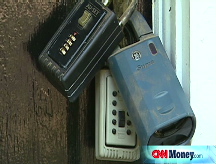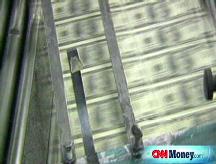Be ticked off - but get over it
You should be angry about the $700 billion plan to save banks. But once the rage subsides, realize that doing nothing would be disastrous.
NEW YORK (CNNMoney.com) -- Americans are very angry about the proposed bailout of the banking sector and Wall Street...and with good reason.
There should be outrage. We should all be disgusted that the government was forced into this situation. I'm infuriated that it came to this.
Of course, we should cap executive pay, which was obscene at many financial firms, immediately. And we should make sure that the CEOs, CFOs and other big wigs that drove their companies into near ruin with overleveraged bets on risky mortgages should not get big severance packages.
But make no mistake. The alternative that many CNNMoney.com readers seem to be calling for - i.e. let all the banks and Wall Street crash and burn - is not viable. In fact, it's incredibly short-sighted.
So once the blind rage subsides, people will hopefully take a long-hard look at what the government has proposed and come to the realization that doing nothing to rid the nation's banks of all the poisonous mortgage assets on their balance sheets would be far far worse.
"Taxpayers have every right to be angry because we've gotten into this mess by a combination of irresponsible behavior and lax regulation," said Chris Probyn, chief economist with State Street Global Advisors in Boston.
"However, if you look forward, by letting those responsible pay the price, there will be a spillover effect and the economy could go into sharp and protracted recession."
First and foremost, a collapse of the banking system would have a huge impact on the job market.
According to the latest government job figures, about 8.2 million American taxpayers are employed by the financial services industry.
Clearly, not all of them are Wall Street fat cats making big bucks - we're talking about bank tellers, accountants, loan officers, executive assistants and many other types of jobs that would be at risk if the financial industry is not saved.
"This was done not to prop up shareholders and executives but to ensure the solvency of the financial system," said John Norris, an economist and managing director with Oakworth Capital, a private bank based in Birmingham, Ala.
What's more, without a bailout, the credit crunch would undoubtedly continue, making it even more difficult for financially responsible borrowers to get mortgages.
"I don't think the government had a choice but to take these bad debts of the banks' books," said Tom Higgins, chief economist with Payden & Rygel, a Los Angeles-based money management firm.
"What makes capitalism work is borrowing and lending. The problem, without this bailout, would have been you would have condemned the economy to a period of halting growth at best," Higgins added.
And if that happened, the credit crunch would become an outright credit freeze. Suddenly then, all sorts of industries closely related to the banking and housing sectors would be in major trouble.
The residential construction sector employed 834,000 people in August. Furniture and home furnishing retailers had another 568,000 workers on their payrolls. And building material stores (think Home Depot (HD, Fortune 500), Lowe's (LOW, Fortune 500), etc.) employed another 1.24 million Americans.
Add that up and you've got nearly 11 million people, or just under 10% of the entire nation's labor force, working in industries that could be directly (and negatively) affected if the financial services sector and housing market were left to just sort themselves out.
"Nobody wanted this to happen. It ticks me off as a taxpayer but what were the options? Let the entire banking system go under? Then you might not have a job," Norris added.
The bailout will certainly come at a great economic price. The current estimate is $700 billion. There's no escaping the fact this will add to the nation's already sizable deficit.
Still, given the nature of this bailout - the government isn't really handing out grants per se but is hoping to sell off mortgage-related assets over time to recoup some of the costs - it is impossible to tell just yet what the final price tag will be.
That said, Norris believes that the bailout will shave about a percentage point of the nation's economic growth a year for at least the next five years.
But he and Probyn both maintained that once people get past feeling bitter, hurt and angry about the bailout, they will hopefully realize that this is the right solution. The risk of doing nothing was an even worse financial calamity.
"We couldn't just keep applying Band-Aids. We have to have a comprehensive package or we'll just stumble from crisis to crisis," Probyn said. "I don't like the bailout. It leaves a bad taste in my mouth. But it is the better of the two alternatives." ![]()




